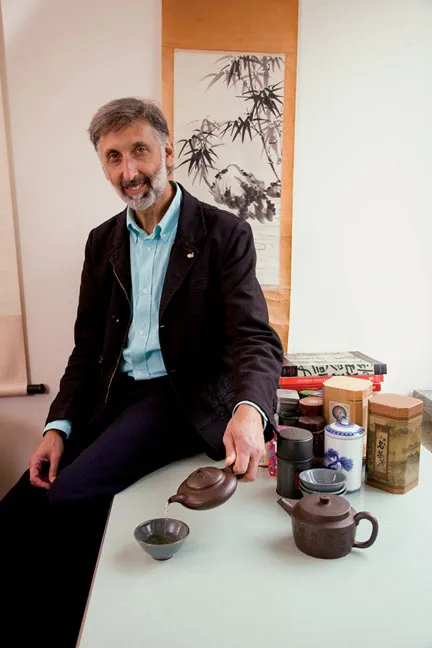In Memory of Alan Berkowitz

President Valerie Smith shared the following in a community message earlier this month:
Dear Friends,
With great sadness I write with the news that Alan J. Berkowitz, Susan W. Lippincott Professor of Modern and Classical Languages and Professor of Chinese, died this week while traveling in Taiwan. The College has lost a highly respected, internationally recognized mentor and colleague who embodied the role of teacher-scholar.
Berkowitz, who chaired Asian Studies and served as the Chinese section head for 15 years, joined the Swarthmore faculty in 1989 when Chinese was the smallest section of Modern Languages & Literatures (MLL). As the sole professor of Chinese, he exercised wise leadership and worked tirelessly to make the fledgling section into a vibrant program and became its first tenured professor. Chinese is now the second largest program in MLL after Spanish.
“Alan exemplified the liberal arts spirit in engaging with his students in a very sincere and personal way,” says Associate Professor of Japanese Will Gardner, who cites Berkowitz as a kind and supportive mentor. “He had a tremendous love and respect for the Chinese classics that he taught, and I believe that he tried to apply the spirit of humanity, humility, and aesthetic cultivation that he encountered in many of these texts to his own life and to his approach as a teacher and scholar.”
Hans-Jakob Werlen, an MLL colleague in German, remembers Berkowitz as “a man of great erudition” and “a true cosmopolitan,” equally at home in Italian and French as he was in Mandarin. “The respect and love his students had for Alan,” he says, “found expression in their devoted attachment to him for many, many years after graduation.”
Professor of Russian Sibelan Forrester describes Berkowitz as an intellectual who worked with multiple literary and philosophical traditions. “At the same time, he was kind and accessible,” she says, “and his teaching was always infused with creativity and a sense of humor.” Berkowitz was about to begin a semester of sabbatical leave and was preparing for that research and writing. “Part of our loss,” she adds, “is the fascinating work that he will not complete.”
“We all came to deeply value Alan's great care with students, his patience, and gentle manner of leadership, along with his solid scholarship and his high standards,” says Professor of Religion Steven Hopkins. “He will be greatly missed as we begin to expand the breadth of the Asian Studies Program at Swarthmore, a program he helped so much to shape and to sustain.”
Berkowitz, 65, grew up in Newton, Mass. After earning a B.A. in Asian studies and comparative literature from the University of Vermont in 1975, Berkowitz continued his Chinese language studies in Taiwan, including in graduate classes in Classical Chinese literature at National Taiwan University in Taipei. He then completed an M.A. (1980) and Ph.D. (1989) in Classical Chinese Language and Literature at the University of Washington.
Berkowitz spent a year at the University of Virginia as an assistant professor of Chinese before coming to Swarthmore, where he taught classes in Chinese language, literature, and humanistic culture, including traditional philosophy, religion, and aesthetics. He received a Lindback Distinguished Teaching Award and a Flack Faculty Award for excellence in teaching.
Berkowitz’s primary research interests spanned the poetry and culture of the Six Dynasties and Tang period of Chinese history. He also studied the cross-section of traditional literature and thought; individualism in conduct and portrayal; and with relation to environmental studies, mountains, tea, and culinary traditions. In the words of retired history professor Lillian Li, Berkowitz was “a superb and exacting scholar” and "Swarthmore’s major authority on Chinese philosophy, literature, and history of the pre-modern era."
In 2000, Berkowitz published Patterns of Disengagement: The Practice and Portrayal of Reclusion in Early Medieval China, about which a reviewer in the American Journal of Chinese Studies wrote: "This book is a scholarly joy…[Berkowitz's] writing is clear and felicitous. Anyone with an interest in the subject can take pleasure in it and find an occasional flower.” He also edited a series of books on exemplary conduct in traditional Chinese culture and contributed to a collaborative project concerning the German polymath G. W. Leibniz and his association with the French Jesuits at the Chinese court in the late 17th and 18th centuries.
Berkowitz served as president of the Early Medieval China Group, as book review editor for the journal Early Medieval China, and as board member of the T'ang Studies Society. At Swarthmore, he received a $1 million grant from the Freeman Foundation for initiating the College’s Japanese language, literature, and culture program. He also served as administrator and chair for initiating the Arabic language and literature program at the Tri-Colleges.
Berkowitz, with Professor of Chinese Haili Kong, often looked for ways to introduce students to Chinese culture. Kong says trips, both regionally and abroad, are examples of his colleague's "highly creative and diverse program to engage his students with the ancient Chinese culture."
Berkowitz is remembered for translating the classical Chinese poetry he loved with sensitivity and nuance. He also dabbled at playing the qin, a traditional Chinese stringed instrument.
In a 2009 interview in The Bulletin, Berkowitz attributed his interest in “all things Chinese” to meeting a teacher of Classical Chinese in a Vermont bar in 1973. “I’d read a lot about East Asian thought in translation,” he said, “but he advised me to read it in the original, for it was very different. So I went back to college and studied Classical Chinese with him at the University of Vermont. He was right.”
Berkowitz, who lived in Swarthmore, is survived by his wife, Titina Caporale, a lecturer in Italian at Philadelphia University, and their son, Norian. An on-campus memorial is planned for the fall semester.
Sincerely,
Val
Valerie Smith
President



